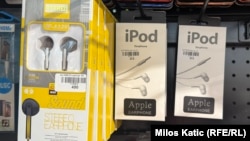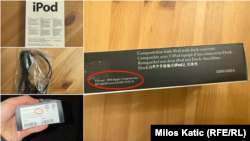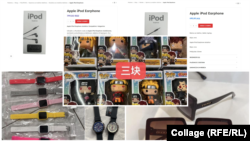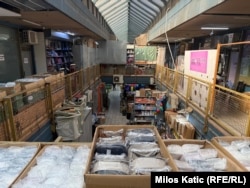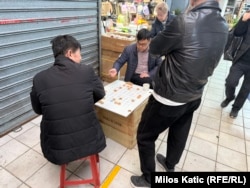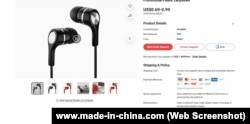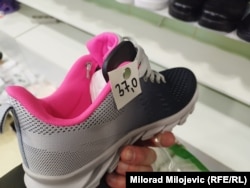NOVI SAD, Serbia -- On the shelves in one of the many Chinese-owned stores here in Serbia's second-largest city are earbuds packed in a white cardboard box that reads "iPod."
Customers might think they're getting something produced by US electronics giant Apple. But eagle-eyed buyers might notice something else is off besides the cut-rate price -- just under $2 -- for such earbuds, which typically cost around $20 in Serbia.
The box reads "Apple Earphone" -- in the singular, rather than plural. And it says the contents were "made in Califomia" -- with "m" instead of "rn" in the name of the state where Apple is headquartered.
The earbuds are among the flood of Chinese-made goods masquerading as famous Western brands that have poured into the Balkans and crowded shelves in shops owned by Chinese immigrants that have mushroomed across the region in recent years.
There is no exact data on the total volume of Chinese goods shipped into the Balkans for sale as counterfeit Western products, which include not only fake Apple electronics but also shoes, clothing, and products billed as global brands like Nike, Tommy Hilfiger, Adidas, Hugo Boss, Armani, Gucci, and Louis Vuitton.
But customs data suggests the number runs at least in the hundreds of thousands of units annually, and RFE/RL's Balkan Service has established at least one route by which these products make it to Balkan store shelves -- including a stopover in an Italian port with notorious mafia connections.
A Serbia-based Chinese businessman who was until recently active in the import-export business said that around 85 percent of these goods that arrive in Serbia are shipped from the port of Ningbo on China's eastern seaboard.
Up to 2,000 items can be transported per container, making control of each item difficult, the businessman said on condition of anonymity due to possible legal repercussions.
"Customs cannot check every container and every product," he said.
The wholesale purchase of these counterfeit items is typically conducted with cash and between parties who know one another and have longstanding business relations, he added.
The businessman said that from Ningbo, goods are shipped to the Italian port of Gioia Tauro in Italy. From there, he said, counterfeit goods are transferred in smaller ships to ports in Rijeka, Croatia; Bar, Montenegro; and Kopar, Slovenia.
RFE/RL's Balkan Service independently corroborated this route with customs authorities in Serbia, Croatia, Montenegro, and Italy.
After reaching Slovenia, Croatia, or Montenegro, the counterfeit goods are then transported to Serbia via road and rail, the Serbian Customs Administration told RFE/RL.
The agency said that last year alone its officers seized 104,000 products due to suspected intellectual property rights violations, while more than 61,000 items were destroyed -- mostly textiles.
Croatian customs officials told RFE/RL that they handle around 600 cases of suspected intellectual-property infringement cases annually, primarily at ports in Rijeka and Ploce but also at the Bajakovo border crossing with Serbia. Around 85 percent of these goods come from China, and the majority of the goods are counterfeit EU and US brands, they said.
The Montenegrin Customs Administration told RFE/RL that China remains a key country of origin for all types of counterfeit goods. Montenegrin customs officers last year seized 5,274 counterfeit items from China, up from 3,303 the previous year, it said.
The Chinese Connection
The Balkans region has become strategically important for China, which has invested in massive infrastructure projects there and signed a free-trade agreement with Serbia that has been in place since July 2024.
A majority of the Balkan countries are not members of the European Union but are part of China's Belt and Road Initiative (BRI), a global infrastructure development strategy launched by Beijing in 2013 that some Western governments warn could lead to excessive debt to China.
Chinese exports to Serbia rose an average of 16.7 percent annually from 2018 to 2023, jumping from $1.8 billion to nearly $4 billion in that period, according to the most recent data from the Observatory of Economic Complexity, a trade data platform.
Among dozens of China-based companies offering their products to the Balkan market through local Serbian companies is Shenzhen VBO Industrial Co., which produced earbuds that appear identical to those in the counterfeit Apple box in the Novi Sad shop visited by reporters. The company did not respond to a request for comment about its products being sold under the Apple brand.
Based in the Tianan Cyber Industrial Park in the city of Shenzhen in southeastern China, the plant covers 6,000 square meters and specializes in producing audio equipment.
Shenzhen VBO Industrial's website lists the price for the earbuds that reporters bought in the Novi Sad shop as $0.69-$0.99, and they are sold in a box without an Apple label. It is unclear whether the headphones that reporters found in Novi Sad were bought directly from the Chinese firm or from intermediaries in Serbia.
In neighboring Bosnia-Herzegovina, RFE/RL's Balkan Service visited Chinese-owned stores and observed other counterfeit US brands, including Nike sneakers for $20 and Tommy Hilfiger shirts for $11 -- significantly cheaper than the originals.
'Low Risk, High Profit'
RFE/RL's Balkan Service sought comment from the Italian financial police -- the Guardia di Finanza -- about Italy's role as a stopover for counterfeit Chinese goods that are shipped on to the Balkans.
Officials there responded with an October 2023 press release describing an "illegal assembly line" of counterfeit products involving Italian and Chinese organized crime -- and indicating that counterfeit labels and packaging are added to some of these goods after arrival from China.
Italian financial police did not respond to specific questions about Gioia Tauro, the port in the Italian province of Calabria that the Serbia-based Chinese businessman called a key stopover for counterfeit goods coming to the Balkans from China.
But the Gioia Tauro port is known as a hub for drug trafficking allegedly linked to the the notorious Italian crime syndicate known as the 'Ndrangheta.
Italian authorities in 2022 and 2024 said they uncovered 'Ndrangheta-linked criminal networks suspected of smuggling hundreds of millions of euros' worth of cocaine into Europe through Gioia Tauro, an operation that allegedly involved corrupt port employees.
Ruggero Scaturro, a senior analyst with the Switzerland-based NGO Global Initiative, described Gioia Tauro as the place where the legal and illegal intertwine under the firm grip of the ‘Ndrangheta.
"In essence, Gioia Tauro operates in a dual reality: a major commercial hub where anyone can theoretically trade, but one where the rules of access for illicit goods are dictated by the ‘Ndrangheta," Scaturro, whose organization monitors global organized crime worldwide, told RFE/RL.
He underlined that between Asia, the Middle East, and the EU, the Balkan region functions as a natural gateway for goods moving westward and that it remains a key distribution point.
"Counterfeit trafficking is rarely an isolated business but is often managed by the same criminal networks that control other illicit businesses," Scaturro said.
"The appeal is clear: While drug trafficking carries severe legal consequences, counterfeit smuggling remains a relatively low-risk, high-profit enterprise, making it a lucrative secondary business for these groups," he added.




